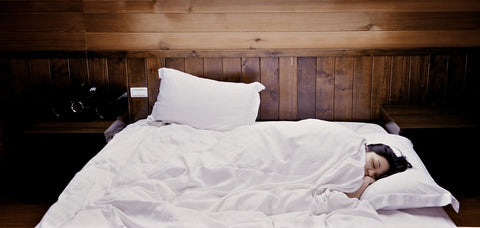How Poor Sleep Can Affect You

Humans spend a third of their lives asleep. Although brain activity is reduced, sleep is actually a neurologically active state, in other words it is a state that is actioned by the brain to perform. Sleep definitely serves a purpose, though what this is exactly is still a matter for debate and further research.
Poor sleep or insomnia affects about 20% of the population and the effects can be subtle in the short term, but more severe restriction of sleep, such as for a week, leads to profound cognitive deficits (actually similar to those seen in some stroke patients), which you may not even notice.
Effects of sleep restriction include:
- Tiredness (obviously)
- Poor memory and concentration
- Poor social skills
- Poor work and academic performance
- Low mood and irritability
- Anhedonia (that's fancy talk for not enjoying activities)
- Poor motivation and initiative
- Increased risk of errors or accidents while driving
- Headaches
A study which looked at healthy men and women over a 22 year period, showed that in men experiencing both reduced sleep (less than 6 h/night) and disturbed sleep, there was an increase in cardiovascular disease. In women, experiencing either short sleep or disturbed sleep was associated with increased cardiovascular disease. Other studies have shown that sleeping less than 5 hours, was related to increased body mass index, obesity, diabetes, high blood pressure, high cholesterol, heart attack, stroke and a decrease in immune system function.
Causes include:
- External factors such as light, noise.
- Pain and heartburn
- Effects of shift work or jet lag
- Psychological disorders such as anxiety and depression
- Caffeine, alcohol, smoking and various medicines
- Stress
Sleep Hygiene
No, this doesn't mean you have to have clean sheets. It's the practice and behaviour associated with ensuring good healthy sleep.
Behaviour:
- Fix a bedtime and a wake-up time
- Avoid napping during the day or limit o 30-45 mins
- Avoid alcohol before bedtime. Though the immediate effect is conducive to sleep, as alcohol levels drop, there is a stimulant effect
- Avoid caffeine 4-6 hours before bedtime
- Avoid heavy, spicy, or sugary foods 4-6 hours before bedtime
- Exercise regularly, but not right before bed
- Warm milk and foods such as bananas, are high in tryptophan and may help
- Try relaxation techniques
- Don't take your worries to bed
Environment
- Comfortable bedding
- Find a comfortable temperature. A cool (not cold) bedroom is conducive to sleep
- Ensure good ventilation
- Block out all distracting noise, I personally use silicone ear plugs and to this day have always heard my alarm-clock
- Eliminate as much light as possible
- Reserve the bed for sleeping (ok and sex). Don't work from your bed as you will want to dissociate from work
- Get into your favourite sleeping position
- Falling asleep with the television on is a bad idea. Other than the fact that TV engages you very well, it is also blasting photons (light particles) directly to your eyes and keeping you awake. The latter also applies to tablets and backlit reading devices. Listening to the radio or music is better
The last option should be sleeping tablets. However, if you do have to take them, then go for over-the-counter medication first. I mostly found that sleeping tablets mask the underlying cause of insomnia and so I will only prescribe a very short course and my main treatment is in trying to solve the root of the problem.
A good website with lots of info is The Sleep Council
“If sleep does not serve an absolute vital function, then it is the biggest mistake the evolutionary process ever made.” - Allen Rechtschaffen
This blog is written by friend of Neat, Dr Nick Ambatzis MB BS, MSc (SEM), MRCGP.
Nick is a General Practitioner specialising in Sports and Exercise Medicine. He completed his medical degree at University College London Medical School in 2002. Nick worked for almost ten years as a junior surgeon and spent three years in Trauma & Orthopaedics. He attained a Masters in Sports and Exercise Medicine and subsequently trained as a GP practising in Paddington.
From an early age, Nick has been both a keen cross-country runner and water-polo player, having competed at college level. Nick is also an accomplished ultra-marathon runner, having competed in many cross-country and cross-alpine races, ranging from 50-100 miles. He has also been a Crossfit and Crossfit Endurance coach.
